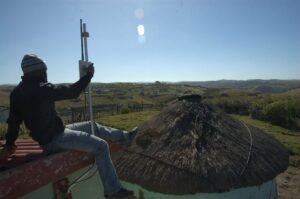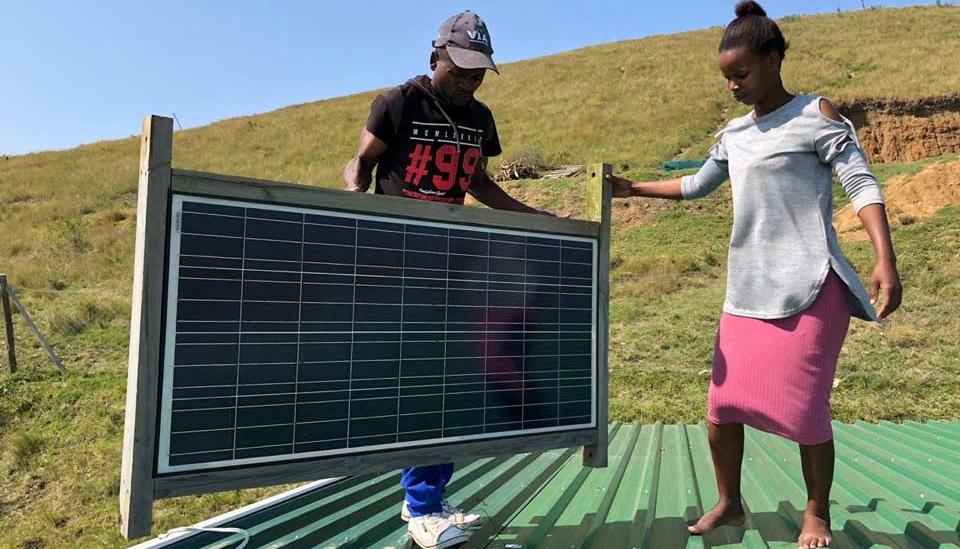This is part of our series of blogs on Community Networks.
Zenzeleni was set up in 2012 by two friends, a University of the Western Cape (UWC) doctoral student; Carlos Rey Moreno, and a local community activist; Masibulele ‘Jay’ Siya. It started as a local wireless intranet to provide free voice service to the community between analogue phones connected to Wi-Fi routers and Voice over IP (VoIP) technology connected by solar-powered routers in rural South Africa. It later included an external connection to the internet via a 3G modem to make calls to national numbers.
As of January 2020, South Africa had 36.54 million internet users, where 34.93 million were mobile internet users with the household disposable income of about 34,037 South African Rand in 2019, according to Statista.
Different internet providers offer different prices for specific data amounts with most people aiming to find the cheapest uncapped internet in the country.
Fibre internet offers impressive speeds and is the people’s choice. Unfortunately, it is inaccessible to everyone since the roll-out is still ongoing with most areas of the country not covered yet. The need for data is way bigger than its supply. Since users have to find alternatives that work for them, fixed LTE and DSL connections with great coverage come in handy with increasing competition.Â
DSL packages are more affordable with high speeds of up to 40Mbps, hence offering a better solution where no home Wi-Fi deals exist.
 ISP packages on DSL are;  Capped and uncapped deals.Â
Capped data has monthly allocated data which once depleted requires top-up to regain connection while Uncapped deal prices are dependent on the service providers
| ISP | CAPPED/UNCAPPED | SPEEDS | PRICE |
| Afrihost 200GB | CAPPED | 4Mbps | R518 |
| Afrihost 400GB | CAPPED | 10Mbps | R838 |
| Vox 300GB | CAPPED | 4Mbps | R548 |
| Axxess 300GB | CAPPED | 8Mbps | R645 |
| MWEB 400GB | CAPPED | 20Mbps | R872 |
| MWEBÂ 500GB | CAPPED | 40Mbps | R1082 |
| Afrihost | UNCAPPED | 4Mbps | R456 |
| Afrihost | UNCAPPED | 20Mbp | R862 |
| Vox | UNCAPPED | 8Mbps | R639 |
| Web Africa | UNCAPPED | 10Mbps | 544 |
| Axxess | UNCAPPED | 40Mbps | R1115 |
Fixed LTE is the alternative for people with no fibre coverage but need fast internet speeds and is comparable to fibre regarding high speed but more expensive. Some of the ISP packages on this category are;
| Afrihost- Rain | 330GB
220GB |
R1599
R1349 |
free data for the first month
free one month data |
| Telkom | 200GBÂ
100GB |
R1099
R799Â |
comes with 200GB extra data from midnight to 7 am
comes with an extra 100GB data from midnight up to 7 am |
| Axxess- Cell CÂ | 100GB
50GB |
R530
R349 |
Telkom, Cell C, and Rain can deliver up to 150Mbps download speeds.Â
In 2014, Zenzeleni established its first legal cooperative ISP -Mankosi cooperative and received an exemption License to deploy and offer telecommunications services by ICASA. The community only pays for the backhaul Internet connectivity, at wholesale prices from companies like EastTel and OpenServe, and for educational use from TENET.
The community network offers quality, affordable, high-speed internet comparable to the country’s most developed urban centres and in 2 community cooperatives which are legal internet service providers; Zithulele which joined in 2018 and Mankosi which is the oldest.

Credits: zenzeleni
The CN operates as an umbrella non-profit company (Zenzeleni), and the local community-owned and operated ISP (the Mankosi cooperative). The non-profit company offers support to the cooperative and acts as a bridge between the local community and the telecommunications sector. It has four directors drawn from relevant fields with vast experiences whose role is to guide the cooperative through various issues; including acquiring license exemptions, building resources, advocacy, managing the network, accessing funding, and creating partnerships, among other things.Â
Cooperative members are elders, men and women, from different community villages and are chosen by the community whose role is to run it to benefit the community. The cooperatives are in charge of; supporting community initiatives, govern, operate and maintain the network, within the communities and offer services to community members, schools, business and organizations. The local businesses and schools are charged a monthly fee for connectivity.Â
The cooperative generates enough income to pay for its bandwidth, replace infrastructure and grow its network by adding more access points. Mankosi cooperative provides micro-loans to residents starting small businesses.
The community network ensures sustainability by using opportunities to generate money and reinvesting it back to the community.
The CN also engages actively with the telecommunications and digital innovation sector in advocating for the right to access, digital equity, service equality and diversity of expression.
Zenzeleni has created partnerships with several institutions;Â
- UWC supports the activities of the network through action research (resulting from the friendship between UWC and the local tribal authority of the Mankosi community established before the network’s inception.)
- Internet Society through grants
- Association for Progressive Communications through grants
- The South African Department of Science and Technology and the Technology Innovation Agency supported the CN to seed a second cooperative (Zithulele) ISP in a new community to test the scalability of the model.
The network aims to significantly cut the costs of telecommunications and retain expenditure within the communities as a form of social entrepreneurship towards bridging the digital divide.
Blog by Nzambi Kakusu, who is passionate about the use of technology to solve societal problems.




